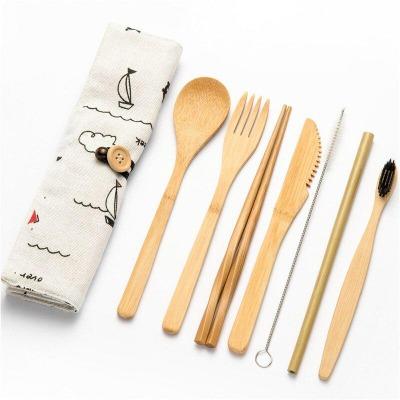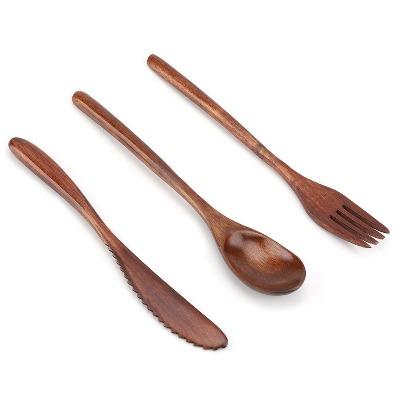Bamboo cover
-
 Save 25%
Save %
Original price $24.00Original price $24.00 - Original price $24.00Original price $24.00Current price $18.00$18.00 - $18.00Current price $18.00
Save 25%
Save %
Original price $24.00Original price $24.00 - Original price $24.00Original price $24.00Current price $18.00$18.00 - $18.00Current price $18.00Bamboo cutlery
A set of wooden cutlery not to be missed The advantages of this product: ✔ Very practical ✔ Ideal for salads ✔ Resistant ✔ More ecolog...
View full detailsOriginal price $24.00Original price $24.00 - Original price $24.00Original price $24.00Current price $18.00$18.00 - $18.00Current price $18.00Save 25% Save % -
 Save 29%
Save %
Original price $14.00Original price $14.00 - Original price $14.00Original price $14.00Current price $10.00$10.00 - $10.00Current price $10.00
Save 29%
Save %
Original price $14.00Original price $14.00 - Original price $14.00Original price $14.00Current price $10.00$10.00 - $10.00Current price $10.00Bamboo cutlery
A set of wooden cutlery not to be missed The advantages of this product: ✔ Very practical ✔ Ideal for salads ✔ Resistant ✔ More ecolog...
View full detailsOriginal price $14.00Original price $14.00 - Original price $14.00Original price $14.00Current price $10.00$10.00 - $10.00Current price $10.00Save 29% Save % -
 Save 25%
Save %
Original price $24.00Original price $24.00 - Original price $24.00Original price $24.00Current price $18.00$18.00 - $18.00Current price $18.00
Save 25%
Save %
Original price $24.00Original price $24.00 - Original price $24.00Original price $24.00Current price $18.00$18.00 - $18.00Current price $18.00ECOLOGICAL cutlery set
OPT FOR THESE RECYCLABLE CUTLERY! The advantages of this product: ✔ High quality materials. ✔ Eco-friendly and recyclable ✔ Comfortable t...
View full detailsOriginal price $24.00Original price $24.00 - Original price $24.00Original price $24.00Current price $18.00$18.00 - $18.00Current price $18.00Save 25% Save %
- Are bamboo utensils reusable?
Of course they are! These handy tools will be with you for a long time, provided you take good care of them.
- Are bamboo cutlery safe?
Yes, they are! Bamboo cutlery is non-toxic and just as safe as metal cutlery as long as you keep it clean.
- Are bamboo cutlery hygienic?
They are more than hygienic. Did you know that bamboo is naturally antibacterial? This means that your bamboo utensils actively contribute to keeping you healthier!
- Are bamboo cutlery dishwasher safe?
Bamboo cutlery is not dishwasher safe. You will therefore have to wash them by hand, ideally immediately after using them.
- How to maintain bamboo cutlery ?
As stated above, you will need to wash your cutlery by hand. It is not good to leave them dirty for a while, and you should also avoid soaking them in water.
- This would reduce their lifespan.
Wash them by hand and let them dry completely, and you will use them for a long time.
- Will my bamboo cutlery get stained or deformed?
Bamboo is heat, water and stain resistant! You won't have to worry about your utensils changing shape or turning yellow from yesterday's delicious curry.
- Can I recycle bamboo utensils ?
Of course you can! Once your utensils have reached the end of their lifespan, you can simply compost them.
- How long does it take for bamboo cutlery to decompose?
Although it depends on the exact conditions, most bamboo cutlery breaks down completely within 3 months. It's cool, right?
- How does using bamboo cutlery reduce waste in the long run?
There are actually several ways to use bamboo cutlery to reduce waste.
The first is perhaps the most obvious: if you're using bamboo cutlery , you're not using (and throwing away) plastic! That's one less fork, knife or spoon that will end up in the ocean. Being able to say "No thanks, I have my own cutlery" is a great way to ensure that you as a consumer are not making the plastic problem worse.
Second, by showing that there is a demand for reusable and environmentally friendly products, you are helping to send a message to big business. They say voting with your money is a way to make a difference - and we agree! It's certainly not the only way to make a difference, but it's something you can do every day to show where your priorities are. And big business will listen, if enough people say the same thing!
By rejecting plastic, especially in packaging, single-use forms and non-sustainable forms, you send a clear message to these companies: "I don't want plastic in my life! - and we think they are starting to listen. From banning straws to banning bags, we're seeing a real reduction in these types of products. It's a slow and gradual change, but it's a change nonetheless, and we're delighted to be at the origin of this change!
Third, the use of bamboo itself helps reduce waste. Instead of using metal or wood, bamboo is the most environmentally friendly material currently produced. Bamboo being a grass, it is not necessary to replant it. It is harvested and new shoots emerge from the roots left in the ground. It does not need fertilizers or pesticides and does not require irrigation either. The amount of waste needed to plant and maintain the trees which are then harvested some 30 years later to make wooden utensils is astonishing - and it is something that is not created by growing bamboo.



